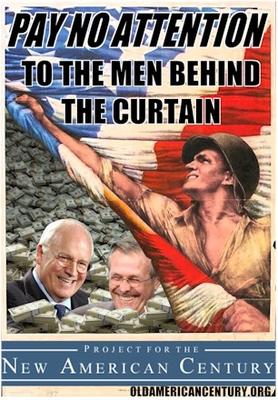
On 28 December 2005, the Chicago Tribune published an article called “Judging the case for war”. The article summarises nine arguments that had been presented by the Bush administration in their case for war, and compares what was “known” then to what is “known” now. The Tribune concludes that invading
1. Biological and chemical weapons
The Bush administration is guilty of telling total outright lies.
2.
3. The quest for nuclear weapons
The Tribune admits that, “Claims that
On the 29th of December, when discussing the Tribune article on Fox News, General Wesley Clark claimed that the nuclear threat was “hyped” by Bush and Condoleezza Rice, and he then further stated outright that the “nuclear argument was false.”
4. Hussein’s delaying tactics
The White House claimed that the longer we left Saddam Hussein alone, the more time he would have to share weapons with terrorists and to develop more and scarier weapons.
The Tribune states that, “the implications of this warning about
5. Waging war on terror
We already know there was no substance to the claim that invading
6. Reform in the Middle East
The Tribune claims that invading
If for the sake of argument we accept these claims, I then ask, At what cost?
However, I still assert that democracy, by definition, cannot be imposed.
7.
Another argument that everyone already knows was complete horseshit. General Wesley Clark confirmed on Fox News that there was no “causative link” between Al-Qaeda and
8. The Butcher of
From the Tribune:
Human Rights Watch estimates that Hussein exterminated 300,000 people. Chemical weapons killed Iraqi Kurds and Iranians; Iraqi Shiites also were slaughtered. Tortures included amputation, rape, piercing hands with drills, burning some victims alive and lowering others into acid baths.
Indeed horrific stuff, and no one questions it. But why
9. Iraqis liberated
From the Tribune:
…And while Kurds, Sunnis and Shiites have major differences to reconcile, a year's worth of predictions that Sunni disaffection could doom self-rule have, so far, proven wrong.
I personally do not think that the picture is really that rosy, but never mind. The question that again has to be asked is, At what cost? And then there is the question of whether it is fair to call an occupation ‘liberation’.
The Tribune’s conclusion
After reassessing the administration’s nine arguments for war, we do not see the conspiracy to mislead that many critics allege. Example: The accusation that Bush lied about Saddam Hussein’s weapons programs overlooks years of global intelligence warnings that, by February 2003, had convinced even French President Jacques Chirac of “the probable possession of weapons of mass destruction by an uncontrollable country,
Seventeen days before the war, this page reluctantly urged the president to launch it. We said that every earnest tool of diplomacy with
Many people of patriotism and integrity disagreed with us and still do. But the totality of what we know now--what this matrix chronicles-- affirms for us our verdict of March 2, 2003.
Max’s response
We all know by now that most of the pre-war intelligence sucked and that Bush and his Neo-Con cronies made shit up. We also know that they never gave a rat’s arse what Jacques Chirac thought. The reasons to go to war that were presented to the American people and the world were just smoke and mirrors anyway, all in the interests of keeping us from figuring out the truth.
The real reason we invaded
You might also be interested at what PNAC have to say for themselves:
The Project for the New American Century is a non-profit educational organization dedicated to a few fundamental propositions: that American leadership is good both for
http://www.newamericancentury.org/
http://www.newamericancentury.org/statementofprinciples.htm
Resources
Wesley Clark/Fox News clip: http://crooksandliars.com/


1 comment:
"such leadership requires military strength, diplomatic energy and commitment to moral principle."
One out of three ain't bad?
Post a Comment